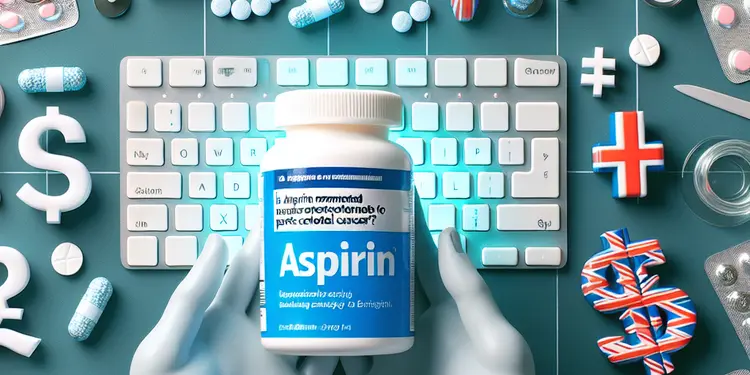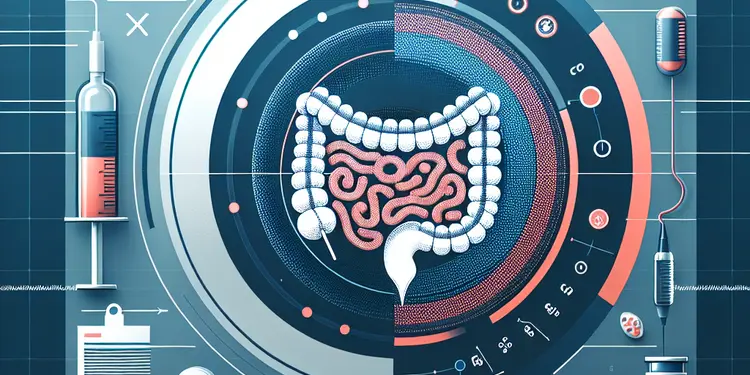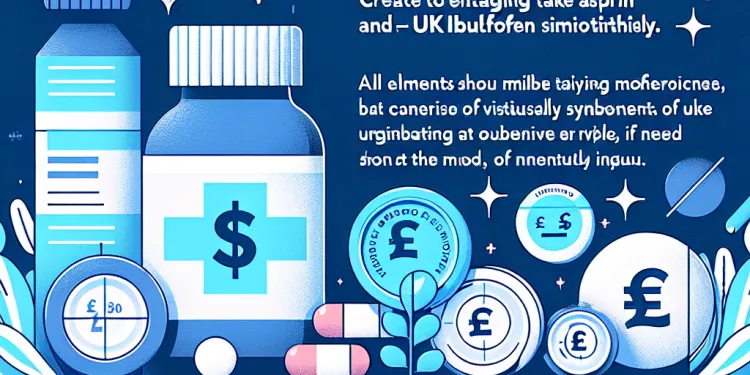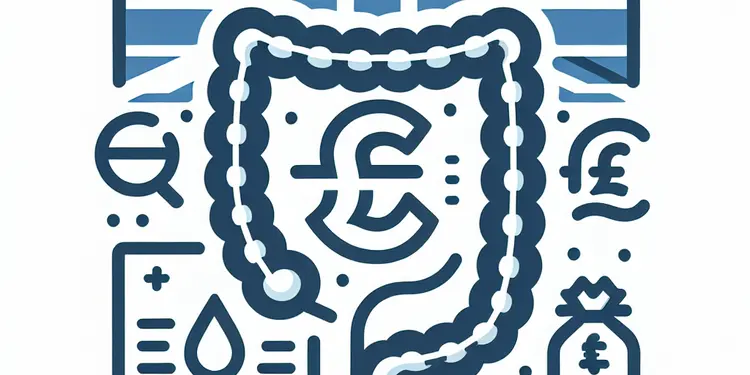
Find Help
More Items From Ergsy search
-

Can aspirin stop colorectal cancer?
Relevance: 100%
-

Is aspirin recommended for everyone to prevent colorectal cancer?
Relevance: 97%
-

Has aspirin been proven to cure colorectal cancer?
Relevance: 95%
-

Should people with a family history of colorectal cancer take aspirin?
Relevance: 91%
-
Is aspirin more effective for certain age groups in preventing colorectal cancer?
Relevance: 88%
-
Is aspirin effective in preventing other types of cancer?
Relevance: 77%
-

Can aspirin prevent colorectal cancer?
Relevance: 72%
-

How does aspirin work to reduce cancer risk?
Relevance: 71%
-

What should I do if I'm considering aspirin for cancer prevention?
Relevance: 69%
-
Has the FDA approved aspirin for cancer prevention?
Relevance: 69%
-
Are there ongoing studies about aspirin and colorectal cancer?
Relevance: 69%
-
How long do studies suggest taking aspirin for cancer prevention?
Relevance: 69%
-

What dosage of aspirin is considered effective for cancer prevention?
Relevance: 68%
-

What is colorectal cancer?
Relevance: 67%
-

What do health organizations say about aspirin and cancer prevention?
Relevance: 66%
-

Is genetic testing available for colorectal cancer?
Relevance: 62%
-

What factors increase my risk of colorectal cancer?
Relevance: 60%
-

What are the recommendations for colorectal cancer screening?
Relevance: 60%
-

Are there risks associated with home colorectal cancer tests?
Relevance: 59%
-

How can I test myself for colorectal cancer?
Relevance: 59%
-

Will insurance cover the cost of home colorectal cancer tests?
Relevance: 58%
-

Can home colorectal cancer tests replace a colonoscopy?
Relevance: 57%
-

What are the advantages of an at-home colorectal cancer test?
Relevance: 57%
-
Can lifestyle changes also help prevent colorectal cancer?
Relevance: 57%
-

How often should I perform a home colorectal cancer test?
Relevance: 56%
-

What is Aspirin?
Relevance: 44%
-

Are home tests for colorectal cancer accurate?
Relevance: 44%
-
Can aspirin interact with other medications?
Relevance: 42%
-

Is Paracetamol the same as Aspirin?
Relevance: 42%
-

Are Aspirin and Ibuprofen the same?
Relevance: 41%
-

What are the side effects of Aspirin?
Relevance: 41%
-

What alternative methods exist to screen for colorectal cancer?
Relevance: 39%
-

Can lifestyle factors influence the results of a colorectal cancer test?
Relevance: 39%
-

What are the main methods for testing yourself for colorectal cancer?
Relevance: 39%
-

Can I take Aspirin and Ibuprofen together?
Relevance: 38%
-

Can aspirin help in reducing the risk of strokes?
Relevance: 38%
-

Do all studies agree on aspirin's effectiveness in preventing colorectal cancer?
Relevance: 37%
-

Which one is better for headaches: Aspirin or Paracetamol?
Relevance: 37%
-

At what age should I start testing myself for colorectal cancer?
Relevance: 37%
-
Should individuals with certain medical conditions avoid aspirin?
Relevance: 37%
Introduction to Colorectal Cancer and Aspirin
Colorectal cancer is a serious health concern and represents one of the most common types of cancer affecting both men and women in the UK. It encompasses malignancies that begin in the colon or the rectum. Early detection and preventative strategies are crucial in managing and potentially reducing the incidence of colorectal cancer. Interestingly, aspirin, a common and widely available medication, has emerged as a potential ally in the fight against this type of cancer.
Understanding Aspirin's Role
Aspirin, or acetylsalicylic acid, is primarily known for its properties as a pain reliever and anti-inflammatory agent. It is frequently used to treat minor aches, pains, and fevers, and has significant benefits for cardiovascular health when used as an anticoagulant. However, recent research suggests that aspirin might also have protective effects against certain types of cancer, including colorectal cancer.
Evidence Supporting Aspirin's Benefits
The potential chemoprotective effect of aspirin against colorectal cancer has been a subject of several studies. Research indicates that regular use of low-dose aspirin may lower the incidences of colorectal cancer, possibly due to its anti-inflammatory properties. Inflammation is a known risk factor for many types of cancers, including colorectal cancer, so reducing inflammation may lead to a lower cancer risk.
A landmark study published in the Lancet and conducted by researchers involved with the Oxford University found that patients who took daily aspirin had a significantly reduced risk of developing colorectal cancer after five years of consistent use. The effect seemed to continue even several years after stopping aspirin use, suggesting long-term preventive benefits.
Considerations and Recommendations
While the evidence is promising, aspirin is not without its risks. It can cause gastrointestinal bleeding and has been associated with other side effects like ulcers and bleeding problems. Therefore, it is crucial that individuals do not self-prescribe aspirin as a preventive measure against colorectal cancer without consulting a healthcare professional.
The National Institute for Health and Care Excellence (NICE) and other medical bodies advise that the decision to use aspirin for cancer prevention should be made on an individual basis, taking into account personal risk factors such as age, family history, and overall health status.
Conclusion
In conclusion, while aspirin shows potential as a preventive measure against colorectal cancer, it must be used judiciously and under medical supervision. Further research is needed to fully understand the mechanisms by which aspirin may reduce cancer risk and to identify which populations are most likely to benefit from its use. As science progresses, aspirin could play a more defined role in colorectal cancer prevention, contributing to public health strategies aimed at reducing cancer incidence in the UK and beyond.
What is Colorectal Cancer and How Can Aspirin Help?
Colorectal cancer is a type of cancer that starts in the colon or rectum. It is common and affects both men and women. It is important to find it early and try to stop it from happening. Interestingly, a common medicine called aspirin might help to prevent this cancer.
What Does Aspirin Do?
Aspirin is a medicine that helps with pain and swelling. People take it for things like headaches or fevers. It also helps keep your heart healthy. Recently, doctors think aspirin might help protect against some cancers, like colorectal cancer.
How Aspirin Can Help with Cancer
Scientists have studied how aspirin might protect against colorectal cancer. They found that taking a small amount of aspirin regularly might lower the chance of getting this cancer. This might be because aspirin reduces swelling, and swelling can lead to cancer.
One big study showed that taking aspirin every day for five years helped lower the risk of colorectal cancer. The good effects lasted even after people stopped taking aspirin.
Things to Think About
Even though aspirin can help, it can also cause problems, like bleeding or stomach ulcers. So, people should not take aspirin to prevent cancer without talking to a doctor first.
Health experts say that it is important to make a personal decision about using aspirin. This should be based on your age, family history, and overall health.
Final Thoughts
Aspirin could help prevent colorectal cancer, but it must be used carefully and with a doctor's guidance. We need more research to understand how aspirin works to lower cancer risks and who it helps the most. As we learn more, aspirin might become more important in plans to prevent cancer in the UK and other places.
Frequently Asked Questions
What is colorectal cancer?
Colorectal cancer is a type of cancer that begins in the colon or rectum, parts of the large intestine.
Can aspirin prevent colorectal cancer?
Some studies suggest that regular use of aspirin can lower the risk of developing colorectal cancer, but it is not guaranteed.
How does aspirin work to reduce cancer risk?
Aspirin has anti-inflammatory properties that may help prevent the growth of cancerous cells in the colon.
Is aspirin recommended for everyone to prevent colorectal cancer?
No, aspirin is not recommended for everyone. It's important to consult a healthcare provider to evaluate the benefits and risks in your specific case.
Are there risks associated with taking aspirin regularly?
Yes, long-term use of aspirin can lead to side effects such as gastrointestinal bleeding and ulcers.
What dosage of aspirin is considered effective for cancer prevention?
The optimal dosage can vary and should be determined by a healthcare provider.
Has aspirin been proven to cure colorectal cancer?
No, aspirin is not a cure for colorectal cancer. It may lower risk, but it cannot treat existing cancer.
Should people with a family history of colorectal cancer take aspirin?
Individuals with a family history should discuss preventive strategies, including aspirin use, with their healthcare provider.
What do health organizations say about aspirin and cancer prevention?
Some health organizations acknowledge the potential benefits but recommend personalized medical advice due to the risks involved.
Can lifestyle changes also help prevent colorectal cancer?
Yes, a healthy diet, regular exercise, and avoiding smoking and excessive alcohol can also reduce risk.
Has the FDA approved aspirin for cancer prevention?
No, the FDA has not approved aspirin specifically for cancer prevention.
How long do studies suggest taking aspirin for cancer prevention?
Some studies suggest benefits after continuous use for at least 5-10 years, but this varies.
Is aspirin more effective for certain age groups in preventing colorectal cancer?
Aspirin's benefits may vary with age; older adults should get medical advice before starting regular use.
Should individuals with certain medical conditions avoid aspirin?
Yes, those with conditions like ulcers, bleeding disorders, or aspirin allergies should avoid it.
Can aspirin interact with other medications?
Aspirin can interact with various medications, so it's important to consult a doctor before use.
Are there ongoing studies about aspirin and colorectal cancer?
Yes, research is ongoing to better understand aspirin's role in cancer prevention.
Is aspirin effective in preventing other types of cancer?
Research mainly focuses on colorectal cancer, but there may be benefits in some other cancers. Consult your doctor for details.
What alternative methods exist to screen for colorectal cancer?
Screening tests like colonoscopy, stool tests, and CT colonography are important for early detection.
Do all studies agree on aspirin's effectiveness in preventing colorectal cancer?
No, while many studies suggest benefits, some show mixed results. Further research is needed.
What should I do if I'm considering aspirin for cancer prevention?
Consult with your healthcare provider to weigh the benefits and risks based on your personal health profile.
What is bowel cancer?
Bowel cancer is a disease in the gut. The gut is the part inside your body where food goes after you eat it. This cancer happens when bad lumps, called tumors, grow in the gut.
If you find it early, doctors can help. It's important to talk to a doctor if you feel unwell.
If it's hard to understand, ask someone you trust for help. They can explain more. You can also use tools like pictures or videos to learn more.
Colorectal cancer is a sickness. It starts in your colon or rectum. This is part of your big intestine in your body.
Can aspirin stop bowel cancer?
Aspirin is a type of medicine. Some people think it might help stop bowel cancer.
If you are thinking about taking aspirin, talk to your doctor. They know what is best for your health.
Here are some tools to help you:
- Ask a friend or family member to help you read or understand this.
- Use online videos or audio to learn more in simple words.
- Write down any questions you have before seeing the doctor.
Some studies say taking aspirin often might help stop bowel cancer, but it doesn't always work.
How does aspirin help lower the chance of getting cancer?
Aspirin is a type of medicine.
It can help stop cancer from happening.
Aspirin works by stopping swelling in your body.
Swelling can sometimes lead to cancer.
If you have questions, it's good to talk to a doctor.
You can also use pictures or videos to help learn more.
Aspirin can help the body stop swelling. This might help stop bad cells in the colon from growing. The colon is a part of our tummy that helps digest food.
Can everyone use aspirin to stop bowel cancer?
Aspirin is not good for everyone. Talk to your doctor to see if it's right for you. They will tell you if it can help you or if it might cause problems.
Is it safe to take aspirin every day?
If you take aspirin every day, there could be some dangers. It is important to be careful.
Talk to a doctor before you start taking aspirin regularly. They can tell you if it is safe for your body.
Using tools like picture cards or voice readers can help make this easier to understand. Remember to ask someone if you need help!
Yes, taking aspirin for a long time can cause problems. It might make your stomach bleed, or you could get sores in your stomach.
If you find it hard to understand, ask an adult for help.
You can also use a tool that reads the text out loud for you.
How much aspirin should you take to help stop cancer?
The right amount of medicine can be different for each person. A doctor or nurse should help decide what’s best for you.
Can aspirin cure bowel cancer?
No, aspirin does not cure bowel cancer. It might help prevent it, but it cannot fix cancer that is already there.
Can taking aspirin help people whose family had colorectal cancer?
If your family has had colorectal cancer, you might wonder if taking aspirin is good for you.
Colorectal cancer means cancer in the colon or rectum. The colon and rectum are parts of your tummy that help digest food.
Aspirin is a medicine that some people take to feel better or stop feeling pain.
It might help to talk to your doctor or nurse before taking aspirin. They can give you advice that is right for you.
Some tools that can help you understand this better:
- Ask a family member or friend to read with you.
- Use a dictionary to look up words you don’t know.
- Write down any questions you want to ask your doctor.
If anyone in your family has had this problem, talk to your doctor. Ask them how you can stay healthy. They might tell you to take aspirin. Your doctor will help you decide what's best for you.
What do health groups say about aspirin and stopping cancer?
Aspirin is a common medicine. Some health groups think it might help stop certain types of cancer.
But, it's important to talk to a doctor before taking aspirin. It can have side effects.
Here are some tips to help understand this:
- Use a simple dictionary to understand hard words.
- Ask someone you trust to explain it to you.
- Use images or drawings to help see ideas.
Some health groups say there might be good things about it. But they say it's important to ask a doctor for advice because it can be risky. You can use tools like picture charts or ask someone you trust to help explain.
Can changing how you live stop bowel cancer?
Yes, how you live can help! Here are some tips:
- Eat healthy food like fruits, veggies, and whole grains.
- Move your body! Do exercises like walking or playing.
- Do not smoke because it is bad for you.
- Have less alcohol. It is better to drink little or none.
Ask a grown-up or a doctor if you need help.
Yes, to stay healthy, eat good food, exercise often, don't smoke, and don't drink too much alcohol.
Is aspirin approved by the FDA to stop cancer?
The FDA is a group that checks if medicines are safe. They have not said 'yes' to using aspirin to stop cancer. If you want to know more or have questions, you can:
- Talk to your doctor.
- Use simple websites with health info.
- Ask someone you trust to help you read health articles.
No, the FDA has not said yes to using aspirin to stop cancer.
How long should you take aspirin to help prevent cancer?
Studies say how long you should take aspirin to help stop cancer. Talk to a doctor. They can tell you more. It’s important to follow what they say.
Some studies say it might help if you use it all the time for at least 5 to 10 years, but it can be different for everyone.
Does aspirin work better for some ages to stop bowel cancer?
Aspirin can be good or bad, depending on how old you are. Older people should talk to a doctor before they start taking it regularly.
Is it safe for people with some health problems to take aspirin?
Yes, people who have health problems like ulcers, bleeding issues, or who are allergic to aspirin should not take it.
Does aspirin mix with other medicines?
Aspirin might not work well with other medicines. Talk to a doctor before you take it.
Are scientists studying aspirin and bowel cancer?
Yes, scientists are looking into how aspirin might help with bowel cancer. They want to see if aspirin can help prevent or treat this type of cancer.
If reading is hard, you can ask someone to read this out loud to you. Or use a device that reads text aloud.
Yes, scientists are still studying how aspirin might help stop cancer.
Can aspirin help stop other kinds of cancer?
Aspirin might help stop some cancers. Scientists are still studying this. It's important to talk to a doctor before taking aspirin for cancer.
Helpful tips:
- Ask someone to explain big words.
- Use a computer or tablet to read out loud.
- Draw pictures to understand better.
Most research looks at bowel cancer, but it might help with other types of cancer too. Talk to your doctor to find out more.
What other ways are there to check for bowel cancer?
Colorectal cancer is also called bowel cancer.
Doctors have different ways to check for bowel cancer:
- Stool test: You put a little bit of your poop on a special card. The doctors check it for signs of cancer.
- Sigmoidoscopy: The doctor looks inside part of your bowel with a thin tube.
- Colonoscopy: The doctor looks inside all of your bowel with a long tube.
- CT Colonography: This is a special kind of X-ray that shows your bowel.
These tests help doctors find cancer early, which is very important.
If you find it hard to understand or need help, you can:
- Ask a friend or family member to read with you.
- Use a dictionary to look up words you don't know.
- Write down questions you might have for your doctor.
Tests like camera tests, poop tests, and special X-rays are important to find problems early.
Do all studies say aspirin helps stop bowel cancer?
No, not all the time. Many studies say there are good things about it. But some studies say different things. We need to learn more.
What should I do if I want to take aspirin to stop cancer?
If you are thinking about taking aspirin to help stop cancer, talk to your doctor first. Your doctor will tell you if it is safe for you.
Here are some things you can do:
- Ask your doctor questions. Write them down so you do not forget.
- Use simple words when talking about your health.
- Bring a friend or family member to help you remember what the doctor says.
- Ask the doctor to explain any hard words.
- Use pictures to help explain your health if needed.
Talk to your doctor. They can help you find out what is good and not so good for your health.
Useful Links
This website offers general information and is not a substitute for professional advice.
Always seek guidance from qualified professionals.
If you have any medical concerns or need urgent help, contact a healthcare professional or emergency services immediately.
- Ergsy carfully checks the information in the videos we provide here.
- Videos shown by Youtube after a video has completed, have NOT been reviewed by ERGSY.
- To view, click the arrow in centre of video.
- Most of the videos you find here will have subtitles and/or closed captions available.
- You may need to turn these on, and choose your preferred language.
- Go to the video you'd like to watch.
- If closed captions (CC) are available, settings will be visible on the bottom right of the video player.
- To turn on Captions, click settings .
- To turn off Captions, click settings again.
More Items From Ergsy search
-

Can aspirin stop colorectal cancer?
Relevance: 100%
-

Is aspirin recommended for everyone to prevent colorectal cancer?
Relevance: 97%
-

Has aspirin been proven to cure colorectal cancer?
Relevance: 95%
-

Should people with a family history of colorectal cancer take aspirin?
Relevance: 91%
-
Is aspirin more effective for certain age groups in preventing colorectal cancer?
Relevance: 88%
-
Is aspirin effective in preventing other types of cancer?
Relevance: 77%
-

Can aspirin prevent colorectal cancer?
Relevance: 72%
-

How does aspirin work to reduce cancer risk?
Relevance: 71%
-

What should I do if I'm considering aspirin for cancer prevention?
Relevance: 69%
-
Has the FDA approved aspirin for cancer prevention?
Relevance: 69%
-
Are there ongoing studies about aspirin and colorectal cancer?
Relevance: 69%
-
How long do studies suggest taking aspirin for cancer prevention?
Relevance: 69%
-

What dosage of aspirin is considered effective for cancer prevention?
Relevance: 68%
-

What is colorectal cancer?
Relevance: 67%
-

What do health organizations say about aspirin and cancer prevention?
Relevance: 66%
-

Is genetic testing available for colorectal cancer?
Relevance: 62%
-

What factors increase my risk of colorectal cancer?
Relevance: 60%
-

What are the recommendations for colorectal cancer screening?
Relevance: 60%
-

Are there risks associated with home colorectal cancer tests?
Relevance: 59%
-

How can I test myself for colorectal cancer?
Relevance: 59%
-

Will insurance cover the cost of home colorectal cancer tests?
Relevance: 58%
-

Can home colorectal cancer tests replace a colonoscopy?
Relevance: 57%
-

What are the advantages of an at-home colorectal cancer test?
Relevance: 57%
-
Can lifestyle changes also help prevent colorectal cancer?
Relevance: 57%
-

How often should I perform a home colorectal cancer test?
Relevance: 56%
-

What is Aspirin?
Relevance: 44%
-

Are home tests for colorectal cancer accurate?
Relevance: 44%
-
Can aspirin interact with other medications?
Relevance: 42%
-

Is Paracetamol the same as Aspirin?
Relevance: 42%
-

Are Aspirin and Ibuprofen the same?
Relevance: 41%
-

What are the side effects of Aspirin?
Relevance: 41%
-

What alternative methods exist to screen for colorectal cancer?
Relevance: 39%
-

Can lifestyle factors influence the results of a colorectal cancer test?
Relevance: 39%
-

What are the main methods for testing yourself for colorectal cancer?
Relevance: 39%
-

Can I take Aspirin and Ibuprofen together?
Relevance: 38%
-

Can aspirin help in reducing the risk of strokes?
Relevance: 38%
-

Do all studies agree on aspirin's effectiveness in preventing colorectal cancer?
Relevance: 37%
-

Which one is better for headaches: Aspirin or Paracetamol?
Relevance: 37%
-

At what age should I start testing myself for colorectal cancer?
Relevance: 37%
-
Should individuals with certain medical conditions avoid aspirin?
Relevance: 37%


